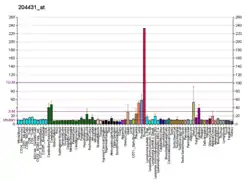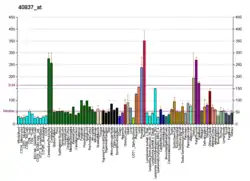TLE2
Transducin-like enhancer protein 2 is a protein that in humans is encoded by the TLE2 gene.[5][6]
References
- GRCh38: Ensembl release 89: ENSG00000065717 - Ensembl, May 2017
- GRCm38: Ensembl release 89: ENSMUSG00000034771 - Ensembl, May 2017
- "Human PubMed Reference:". National Center for Biotechnology Information, U.S. National Library of Medicine.
- "Mouse PubMed Reference:". National Center for Biotechnology Information, U.S. National Library of Medicine.
- Liu Y, Dehni G, Purcell KJ, Sokolow J, Carcangiu ML, Artavanis-Tsakonas S, Stifani S (Oct 1996). "Epithelial expression and chromosomal location of human TLE genes: implications for notch signaling and neoplasia". Genomics. 31 (1): 58–64. doi:10.1006/geno.1996.0009. PMID 8808280.
- "Entrez Gene: TLE2 transducin-like enhancer of split 2 (E(sp1) homolog, Drosophila)".
- Grbavec, D; Lo R; Liu Y; Stifani S (Dec 1998). "Transducin-like Enhancer of split 2, a mammalian homologue of Drosophila Groucho, acts as a transcriptional repressor, interacts with Hairy/Enhancer of split proteins, and is expressed during neuronal development". Eur. J. Biochem. GERMANY. 258 (2): 339–49. doi:10.1046/j.1432-1327.1998.2580339.x. ISSN 0014-2956. PMID 9874198.
Further reading
- Stifani S, Blaumueller CM, Redhead NJ, et al. (1993). "Human homologs of a Drosophila Enhancer of split gene product define a novel family of nuclear proteins". Nat. Genet. 2 (2): 119–27. doi:10.1038/ng1092-119. PMID 1303260. S2CID 32142845.
- Miyasaka H, Choudhury BK, Hou EW, Li SS (1993). "Molecular cloning and expression of mouse and human cDNA encoding AES and ESG proteins with strong similarity to Drosophila enhancer of split groucho protein". Eur. J. Biochem. 216 (1): 343–52. doi:10.1111/j.1432-1033.1993.tb18151.x. PMID 8365415.
- Palaparti A, Baratz A, Stifani S (1997). "The Groucho/transducin-like enhancer of split transcriptional repressors interact with the genetically defined amino-terminal silencing domain of histone H3". J. Biol. Chem. 272 (42): 26604–10. doi:10.1074/jbc.272.42.26604. PMID 9334241.
- Grbavec D, Lo R, Liu Y, et al. (1999). "Groucho/transducin-like enhancer of split (TLE) family members interact with the yeast transcriptional co-repressor SSN6 and mammalian SSN6-related proteins: implications for evolutionary conservation of transcription repression mechanisms". Biochem. J. 337 (1): 13–7. doi:10.1042/0264-6021:3370013. PMC 1219929. PMID 9854018.
- Grbavec D, Lo R, Liu Y, Stifani S (1999). "Transducin-like Enhancer of split 2, a mammalian homologue of Drosophila Groucho, acts as a transcriptional repressor, interacts with Hairy/Enhancer of split proteins, and is expressed during neuronal development". Eur. J. Biochem. 258 (2): 339–49. doi:10.1046/j.1432-1327.1998.2580339.x. PMID 9874198.
- Ren B, Chee KJ, Kim TH, Maniatis T (1999). "PRDI-BF1/Blimp-1 repression is mediated by corepressors of the Groucho family of proteins". Genes Dev. 13 (1): 125–37. doi:10.1101/gad.13.1.125. PMC 316372. PMID 9887105.
- Javed A, Guo B, Hiebert S, et al. (2000). "Groucho/TLE/R-esp proteins associate with the nuclear matrix and repress RUNX (CBF(alpha)/AML/PEBP2(alpha)) dependent activation of tissue-specific gene transcription". J. Cell Sci. 113 (12): 2221–31. PMID 10825294.
- Brantjes H, Roose J, van De Wetering M, Clevers H (2001). "All Tcf HMG box transcription factors interact with Groucho-related co-repressors". Nucleic Acids Res. 29 (7): 1410–9. doi:10.1093/nar/29.7.1410. PMC 31284. PMID 11266540.
- Dintilhac A, Bernués J (2002). "HMGB1 interacts with many apparently unrelated proteins by recognizing short amino acid sequences" (PDF). J. Biol. Chem. 277 (9): 7021–8. doi:10.1074/jbc.M108417200. PMID 11748221. S2CID 39560486.
- Strausberg RL, Feingold EA, Grouse LH, et al. (2003). "Generation and initial analysis of more than 15,000 full-length human and mouse cDNA sequences". Proc. Natl. Acad. Sci. U.S.A. 99 (26): 16899–903. Bibcode:2002PNAS...9916899M. doi:10.1073/pnas.242603899. PMC 139241. PMID 12477932.
- Ota T, Suzuki Y, Nishikawa T, et al. (2004). "Complete sequencing and characterization of 21,243 full-length human cDNAs". Nat. Genet. 36 (1): 40–5. doi:10.1038/ng1285. PMID 14702039.
- Grimwood J, Gordon LA, Olsen A, et al. (2004). "The DNA sequence and biology of human chromosome 19". Nature. 428 (6982): 529–35. Bibcode:2004Natur.428..529G. doi:10.1038/nature02399. PMID 15057824.
- Gerhard DS, Wagner L, Feingold EA, et al. (2004). "The status, quality, and expansion of the NIH full-length cDNA project: the Mammalian Gene Collection (MGC)". Genome Res. 14 (10B): 2121–7. doi:10.1101/gr.2596504. PMC 528928. PMID 15489334.
- Rual JF, Venkatesan K, Hao T, et al. (2005). "Towards a proteome-scale map of the human protein-protein interaction network". Nature. 437 (7062): 1173–8. Bibcode:2005Natur.437.1173R. doi:10.1038/nature04209. PMID 16189514. S2CID 4427026.
- Higa LA, Wu M, Ye T, et al. (2006). "CUL4-DDB1 ubiquitin ligase interacts with multiple WD40-repeat proteins and regulates histone methylation". Nat. Cell Biol. 8 (11): 1277–83. doi:10.1038/ncb1490. PMID 17041588. S2CID 22180568.
This article is issued from Wikipedia. The text is licensed under Creative Commons - Attribution - Sharealike. Additional terms may apply for the media files.





